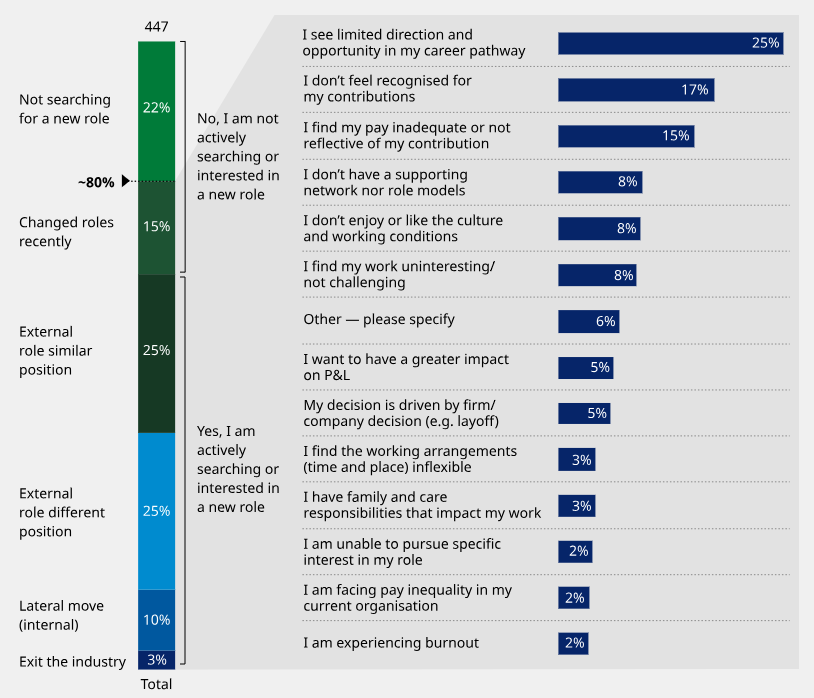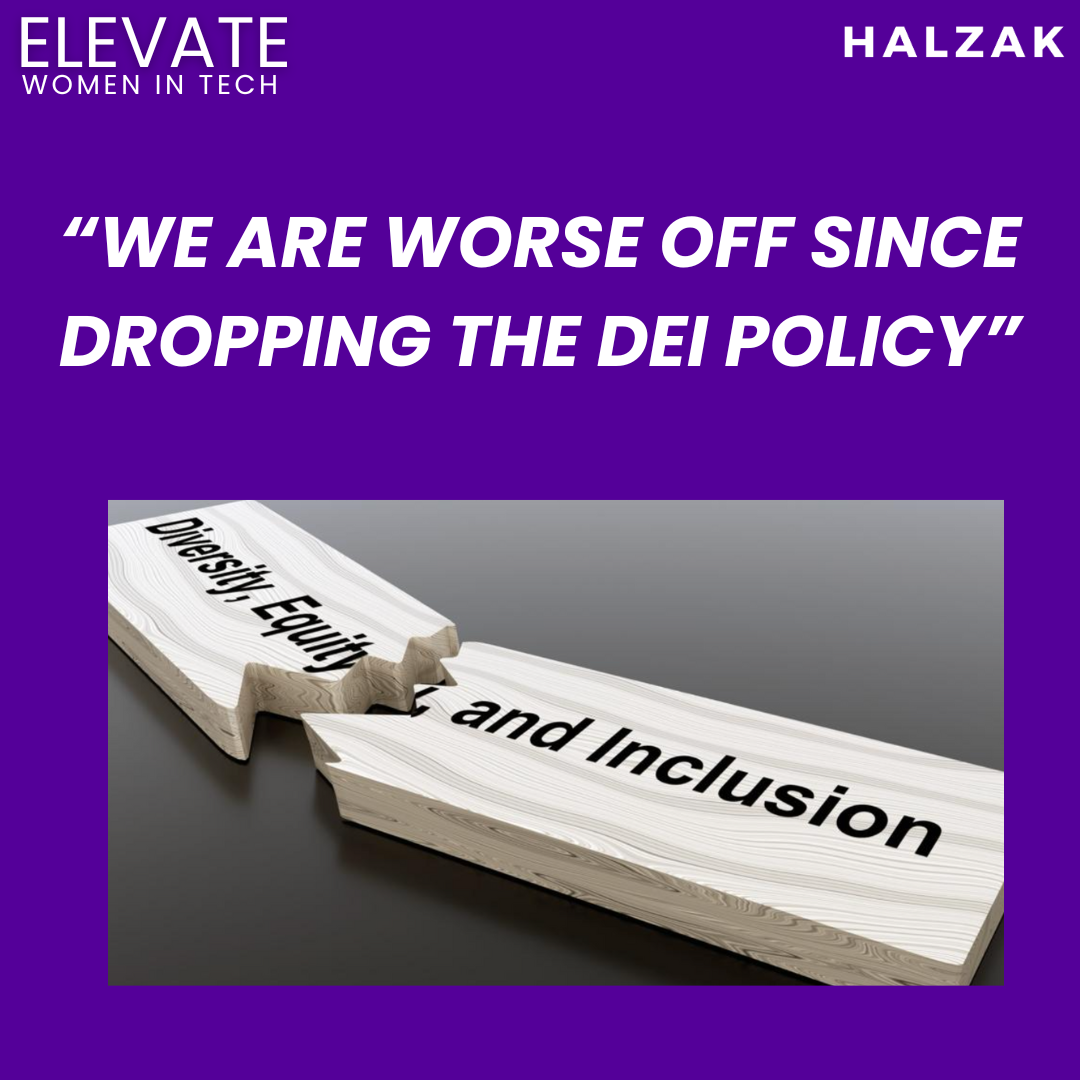

How broken career frameworks are driving women out of tech – and what we can do about it
The UK tech sector stands at a crossroads. While the government ambitiously targets a twentyfold increase in AI research capacity by 2030, a silent crisis is undermining these very foundations. Every year, the UK economy loses between £2 and £3.5 billion as tens of thousands of experienced women exit the tech industry – not because they lack ambition or capability, but because the system itself is fundamentally broken.
The groundbreaking Lovelace Report 2025, produced by WeAreTechWomen in partnership with Oliver Wyman, surveyed over 500 women across the UK tech sector. The findings paint a sobering picture that demands immediate attention.
Between 40,000 and 60,000 women leave UK tech roles annually. To put this in perspective, that’s equivalent to losing the entire workforce of a major tech hub every single year. Of these departures, some women exit the industry entirely, while others take their valuable skills to competitors who offer better career prospects.
Perhaps most alarming is that 78% of women currently working in tech are either actively job searching or considering leaving their roles. This isn’t just turnover – it’s a talent exodus that threatens the very future of UK tech competitiveness.
One of the most significant revelations from the Lovelace Report challenges a persistent industry assumption. Only 3% of women cite caregiving responsibilities as their primary reason for leaving tech roles. This statistic should fundamentally change how we approach retention strategies.
Instead, the real drivers of departure tell a different story:
These aren’t personal failings or lifestyle choices – they’re systemic issues that can be addressed with the right strategies and commitment.

The data reveals a particularly troubling pattern around career progression.
The compensation gap compounds this challenge. Over half of the women surveyed earn below the average salary for their level of seniority, despite 70% having invested in additional qualifications or leadership training to accelerate their careers. The message is clear: investment in professional development isn’t translating into career rewards.
Yet ambition remains strong. An overwhelming 90% of women surveyed want to progress into management roles. However, only 25% believe this progression will happen easily within their current organisations. This gap between aspiration and expectation represents a massive waste of talent and potential.
The financial implications extend far beyond individual careers. With the UK targeting a 20x increase in AI research capacity by 2030, but the sector already facing a shortage of 98,000 to 120,000 professionals, continuing to lose experienced talent at current rates threatens these ambitious goals.
The economic breakdown is striking:
This isn’t just about numbers in a spreadsheet – it represents a significant challenge to the UK’s tech sector growth and development.
The Lovelace Report doesn’t just identify problems – it provides actionable solutions that forward-thinking organisations can implement immediately:
Moving beyond traditional mentoring, this means actively monitoring for signs that employees are stuck and intervening with meaningful opportunities. It requires matching people to projects based on skills and potential rather than familiarity or proximity. Regular audits of high-profile programmes and career progression metrics by gender can identify and address bias before it becomes entrenched.
Visibility drives career advancement. This means deliberately placing experienced women in leadership roles on high-impact projects and ensuring their achievements receive public recognition. Creating additional career-building opportunities through shadow boards, think tanks, and cross-functional assignments helps expand networks and showcase technical expertise.
Ambiguity is the enemy of advancement. Organisations need written progression frameworks that define roles, competencies, and compensation clearly at every level. These frameworks must be embedded into regular reviews, development plans, and learning opportunities. Equally important is making it easier for people to move between teams and functions, not just up traditional hierarchies.
This isn’t about ticking diversity boxes or meeting quotas – it’s about fundamental business strategy. Retaining and advancing women in tech means faster innovation, stronger teams, and more resilient organisations. Companies that act now, building systems that reflect tomorrow’s needs rather than yesterday’s structures, will lead the industry forward.
The organisations that recognise this crisis as an opportunity will gain a significant competitive advantage. They’ll retain institutional knowledge, reduce recruitment costs, and build more innovative teams that better reflect their customer base.
At Halzak, we’re addressing this challenge through our specialised tech recruitment services across Digital, Data, Cyber, and Technology. Our commitment to diversifying talent pipelines means we’re actively working to connect organisations with underrepresented talent that traditional recruitment methods often miss. This approach enables companies to focus on what matters most: hiring the best candidate for each role, while building more inclusive teams.
Elevate Community, our newly launched gender-inclusive platform, is dedicated to advancing gender equality in tech. We connect women, non-binary individuals, and male allies who share a vision of creating a more diverse and inclusive tech industry where everyone can thrive. The platform offers comprehensive support through podcast episodes, curated resources, networking opportunities, mentorship programmes, learning sessions, and professional development workshops where delegates can earn CPD points.
Together, we’re not just placing talent – we’re building the networks, connections, and support systems that create genuine advancement opportunities. We’re working with organisations ready to break down barriers and implement the systemic changes identified in the Lovelace Report.
The future of UK tech depends on our collective response to this crisis. The data is clear, the solutions are available, and the economic imperative is undeniable. The only question that remains is: will we act?
The time for incremental change has passed. The UK tech sector needs bold action to address systemic barriers, transparent career pathways, and genuine commitment to advancing all talent. The £3.5 billion question is whether we’ll seize this opportunity or continue to watch our most valuable assets walk away.
The full Lovelace Report 2025 is available at: https://www.oliverwyman.com/our-expertise/insights/2025/jul/billions-at-risk-if-uk-tech-fails-its-women.html
About the Authors: This article draws from the research and insights of Deborah O’Neill FBCS, Dr Vanessa Vallely OBE, Karen Blake, Irina Iovita, and Constance Le Taillandier, in collaboration with WeAreTechWomen an









